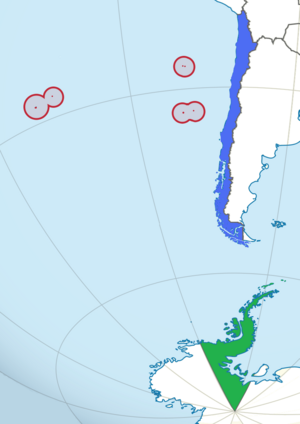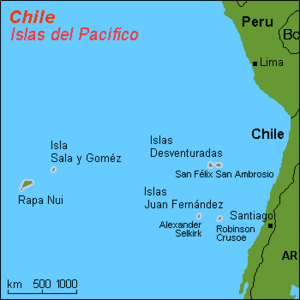Insular Chile facts for kids

In blue: Continental Chile
In red: Insular Chile
In green: Antarctic Chile
Insular Chile, also known as the "Sporadic Islands," is a group of islands far out in the Pacific Ocean. These islands were formed by volcanoes and belong to Chile. They sit on the Nazca Plate, which is a different part of the Earth's crust than the South American continent.
Even though they are not connected to the mainland, the Juan Fernández Islands and the Desventuradas Islands are sometimes called "Continental Insular Chile." Salas y Gómez Island and Easter Island (which is also known as Rapa Nui) are located in Polynesia and are called "Oceanic Insular Chile." All of these islands are managed by the Valparaíso Region in Chile.
Contents
History of the Islands
Early Inhabitants and Connections
Easter Island was first settled by the Rapa Nui, a Polynesian culture. The Rapa Nui people also knew about Salas y Gómez Island a long time ago. Because of this, experts often link these islands more to Oceania than to South America. Most people living on Easter Island today are descendants of the ancient Rapa Nui, and they still see themselves as Polynesians.
Islands Closer to the Continent
The Juan Fernández Islands and Desventuradas Islands are closer to South America. There is no proof that Polynesian people ever lived on these islands. Also, unlike islands in the Atlantic Ocean like the Caribbean Islands, no Native American groups ever lived there.
These islands are sometimes included in a wider idea of Oceania. This is because they are remote Pacific islands with no geological connection to the Americas. Also, the sea animals around them are very similar to those found in other parts of Oceania.
Geography and Environment
What Makes Up Insular Chile?
The Sporadic Islands are not the only islands that belong to Chile. These specific islands cover about 328 square kilometres (127 square miles) of land. This is only a small part, about 0.3%, of all Chilean islands. Chile has 3,739 other islands and 2,180 smaller islets. The total land area of all these islands is about 105,561 square kilometres (40,757 square miles).
Insular Chile includes:
- The Juan Fernández Islands: These include Robinson Crusoe, Alejandro Selkirk, and Santa Clara. They are about 670 kilometres (420 miles) west of Valparaíso.
- The Desventuradas Islands: These are San Ambrosio and San Félix Islands. They are more than 800 kilometres (500 miles) west of mainland Chile, across from the Atacama Region.
- Easter Island, or Rapa Nui: This is the main island of the Sporadic Islands. It is about 3,600 kilometres (2,200 miles) west of Caldera and covers an area of 163.6 square kilometres (63.2 square miles).
- Salas y Gómez Island: This island is about 3,220 kilometres (2,000 miles) west of Chañaral and 415 kilometres (258 miles) northeast of Easter Island.
Only Easter Island and Robinson Crusoe Island have people living on them. Easter Island is the farthest from the South American continent. The Juan Fernández islands have become more like South America in their culture because no people lived there before Europeans arrived.
Administration and Unique Nature
The Sporadic Islands are part of the Valparaíso Region. Easter Island and Salas y Gómez form the commune (a type of local government area) called Isla de Pascua. This is the only commune in the Isla de Pascua Province. The Desventuradas islands and Juan Fernández islands belong to Valparaíso Province and are part of the Juan Fernández commune.
In 2016, a science journal called PLOS One wrote about these islands. They said that "Chile's offshore islands are among the few oceanic archipelagos along the west coast of South America." They also mentioned that "These islands have cultural and ecological connections to the broader insular Pacific." The journal also noted that the Juan Fernández and Desventuradas islands have a special mix of tropical, subtropical, and temperate marine species. Even though they are close to South America, many of their plants and animals are more like those found in the central and south Pacific. This is because of the Humboldt Current, which creates a strong natural barrier between these islands and the continent.
See also
 In Spanish: Chile insular para niños
In Spanish: Chile insular para niños
- Chilean Sea
- Islands of Chile
- Tricontinental Chile
 | Leon Lynch |
 | Milton P. Webster |
 | Ferdinand Smith |


